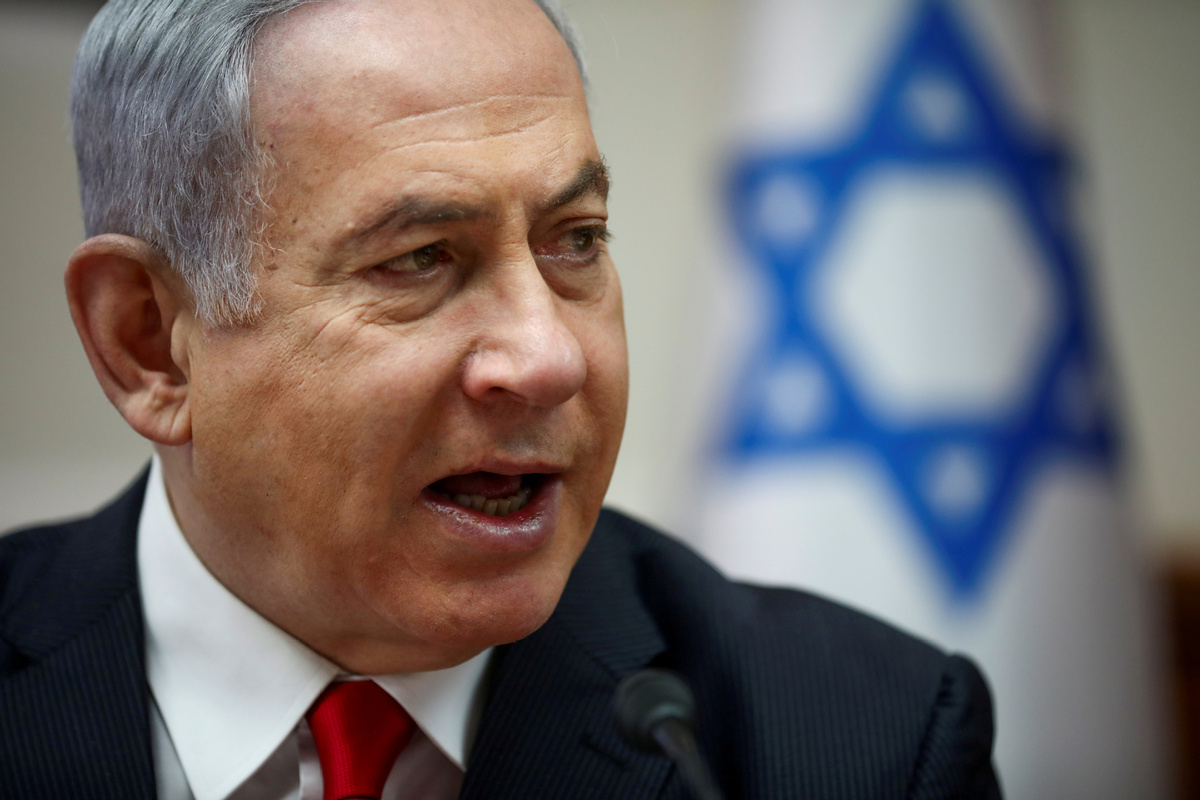
Israeli Prime Minister Benjamin Netanyahu speaks as he chairs the weekly cabinet meeting in Jerusalem, March 8, 2020. (Photo: VCG)
JERUSALEM-Israeli President Reuven Rivlin on Sunday rejected a request to extend coalition talks between the country's two main political parties-appearing to give a boost to Prime Minister Benjamin Netanyahu and pushing the nation toward an unprecedented fourth election in just over a year.
The decision by Rivlin capped a stunning turnaround in the fortunes of Netanyahu, who just a month ago was fighting for his political survival as he prepared to go on trial for corruption charges. His challenger, Blue and White party leader Benny Gantz, now faces an uphill struggle as he races to salvage a power-sharing deal with Netanyahu.
Rivlin last month gave Gantz the task of forming a new government, after a narrow majority of lawmakers endorsed him as prime minister in the wake of March 2 elections. With his parliamentary majority, Gantz began work on legislation that would have prevented Netanyahu from serving as prime minister in the future.
But in an abrupt about-face, Gantz accepted an invitation from Netanyahu to form a "national emergency" government to confront what was then a burgeoning coronavirus outbreak.
Gantz froze the anti-Netanyahu legislation and accepted the post of parliamentary speaker as he began talks on a rotation agreement in which both men would serve as prime minister. The turnabout prompted Gantz's main partner-the secular and middle-class Yesh Atid party-to bolt, causing his Blue and White alliance to disintegrate and leaving it at less than half its original strength.
In the meantime, unity talks with Netanyahu stalled, reportedly over issues that have little to do with the pandemic. Israeli media have reported that Netanyahu insisted on pushing ahead with his plans to annex parts of the Israeli-occupied West Bank and demanded more influence over judicial appointments.
Claiming he was close to a deal, Gantz on Saturday asked Rivlin, who is responsible for choosing a prime minister-designate after elections, for a two-week extension.
But on Sunday, Rivlin rejected the request, citing the "current circumstances". He said he was giving both Gantz and Netanyahu until the original deadline, 11:59 pm on Monday, to reach a deal, and would consider giving them extra time only if both said they were close to agreement.
The deadline, along with the coronavirus crisis, has placed Netanyahu in a much stronger position.
With the outbreak, the court system has been all but shuttered, delaying the prime minister's corruption trial until at least May.
'At a dead end'
While Gantz now appears desperate for a deal, Netanyahu is riding a wave of popularity thanks to his handling of the coronavirus crisis. Israel has reported nearly 11,000 cases and more than 100 dead, but appears to be weathering the crisis better than most countries.
This popularity could give Netanyahu the upper hand in last-minute negotiations with Gantz, or position him well for a future election.
Late on Sunday, the two rivals issued a joint statement saying they would not be giving any more media interviews "in an effort to advance negotiations toward forming a national unity government".
If they fail, a new election isn't guaranteed. Rivlin said he would first give the Knesset, or parliament, three weeks to endorse another candidate as prime minister.
Netanyahu is likely to use that time to try to lure members from the other side or to reach a deal with a weakened Blue and White. After recruiting a defector from the opposing camp on Sunday, he has the backing of 59 lawmakers, two short of a majority.
Without a coalition deal, the country could be headed to elections-albeit with a much stronger Netanyahu and a much weaker opposition in place.
"Gantz is now at a dead end. Politically, Netanyahu made a fantastic move as he usually does," said Eran Vigoda-Gadot, a professor of political science and governance at the University of Haifa.
"Gantz received the mandate to form a government, and with this mandate he essentially formed a government for someone else," Vigoda-Gadot said.


